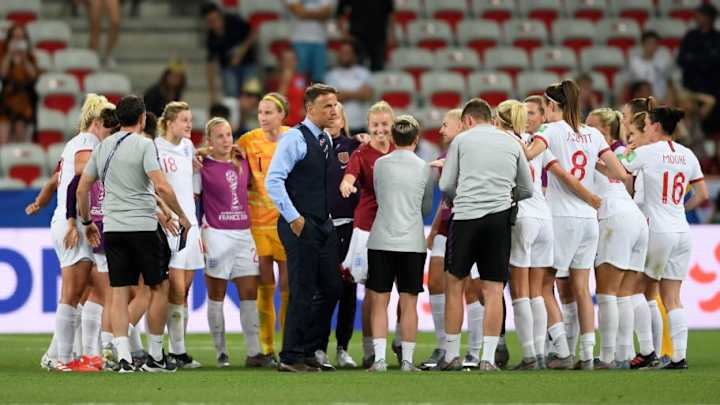England 2-0 Japan: Phil Neville's Lucky Dip Lineup Provides More Questions Than Answers in Nice

Phil Neville loves it when a plan comes together.
“I’m going to play my best team. I want to finish top and win the game,” he told the assembled media the night before Wednesday's Group D decider against Japan. 24 hours later, the very same press corps were handed teamsheets with an England lineup that featured eight(!) changes from the win over Argentina five days previous.
It's fair to say that eyebrows were raised. At least one person half-joked about looking up train tickets to Rennes, where the Lionesses would play their round of 16 match if they lost to Japan and finished second in the group.
12 - England have made 12 changes to their starting lineups across their three matches at the 2019 Women's World Cup (including 8 tonight), more than any other nation. Tinkering. #FIFAWWC #ENG #JPNENG pic.twitter.com/jjG07RHFEs
— OptaJoe (@OptaJoe) June 19, 2019
Four players in the lineup hadn't started either of the first two games. The left-hand side was made up of two players who hadn't played a single minute in the tournament. Only three starters – Lucy Bronze, captain Steph Houghton and the tireless Jill Scott – had been on the pitch for more than 50% of England's minutes.
The Stade de Nice was well under half full, the atmosphere was flat, and the scene was set for a thoroughly underwhelming night. Then England started by giving the ball away, and had to be bailed out by a stunning Karen Bardsley save from Kumi Yokoyama's free kick.
Even if you didn't watch the match, you know roughly what happened next. England scored (Ellen White, delightfully cultured finish, 15 minutes in) and held out.
Neville vindicated, England on track and on target, and some squad players given valuable minutes. Right?
If you get a chance during @Lionesses next match switch your mind to player cam and just watch @ellsbells89 for a bit, she’s absolutely class. Here’s why England fans should and do love her. #LIONESSES #JAPENG https://t.co/2ldgXydwu7
— Ben Haines (@benhainess) June 19, 2019
It's tricky to say. In the short term, yes – the Lionesses won, that's about as successful in a single match as you can be. But they looked sloppy, a lot of passes went astray, and the midfield completely failed to stop Japan from creating chances.
England have now made more changes than any other team in the tournament, with 12 across two games (granted, at the time of writing there are still eight teams waiting to finish their group campaign). As good as it is that Neville has depth in the squad that he trusts, the lack of consistency of selection could prove a problem when the knockout rounds start and that momentum bred by familiarity becomes key.
That's not to say there weren't positives. Toni Duggan's return from injury is a big boost and she'll contribute a healthy amount in the coming weeks, while Rachel Daly's performance as part of a completely changed front three will give Neville pause for thought when putting together his lineup for the round of 16 game against a team yet to be decided.
'Hello, would you like to score?' – England's midfield to Japan for most of this match
— Chris Deeley (@ThatChris1209) June 19, 2019
Georgia Stanway's performance deserves a special mention, providing something in a deepish number 10 role that Fran Kirby has thus far failed to deliver on, despite her undoubted talent. She was denied a goal when her wicked, dipping, bending shot was clawed away by Ayake Yamashita. There were flaws in her performance too, but her range of shots should have her considered for an increased role as the tournament draws on.
The front three played well. But. Keira Walsh was loose in midfield, and even Scott looked leggy by the time the match reached the final 25 minutes. Pass after pass found a blue shirt, wave after wave of attack was repelled – very effectively – by Houghton and Millie Bright in the heart of the defence, arguably England's two stand-out performers on the night, White aside.
Let's leave the last word to Neville, his own counterpoint to the questions. "I said yesterday that we've picked our best team for this game, because the players that we picked was the strongest team to play against this team. There's certain players who are experts in certain games. We need to look at which team we're playing, how they play, how to beat them and then pick the players that fit the profile the best.
Changes, changes, changes. No Parris, Kirby, Mead, Greenwood... pic.twitter.com/3esF9WQGaQ
— Chris Deeley (@ThatChris1209) June 19, 2019
"We strategically plan each rotation. At times when you make more than five changes you suffer with rhythm and flow and I think we did that tonight – but we had some players who needed those minutes. We knew that at times we might suffer, but I think it was a game we needed to have to keep us focused."
